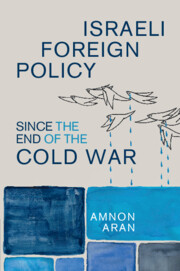Book contents
- Israeli Foreign Policy since the End of the Cold War
- Cambridge Middle East Studies
- Israeli Foreign Policy since the End of the Cold War
- Copyright page
- Dedication
- Contents
- Maps
- Figures
- Acknowledgements
- Chronology
- Abbreviations
- Maps
- Introduction
- 1 Entrenchment
- 2 Redirection
- 3 On the Brink of Peace?
- 4 Engagement Incomplete
- 5 Engagement under Assault
- 6 The Dividends of Engagement
- 7 Unpicking the Oslo Accords
- 8 Backtracking
- 9 Just Beyond Reach
- 10 Between Engagement and Unilateralism
- 11 In Search of a Foreign Policy Paradigm
- 12 A Perfect Storm
- 13 The Road Map for Regime Change
- 14 The Resurgence of Unilateralism
- 15 Events Dear Boy, Events
- 16 The End of the Road
- 17 Vulnerable Ties
- Epilogue: Israel’s Wondrous Decade?
- Appendix List of Persons Interviewed
- References
- Index
- Books in the Series
14 - The Resurgence of Unilateralism
Published online by Cambridge University Press: 15 December 2020
- Israeli Foreign Policy since the End of the Cold War
- Cambridge Middle East Studies
- Israeli Foreign Policy since the End of the Cold War
- Copyright page
- Dedication
- Contents
- Maps
- Figures
- Acknowledgements
- Chronology
- Abbreviations
- Maps
- Introduction
- 1 Entrenchment
- 2 Redirection
- 3 On the Brink of Peace?
- 4 Engagement Incomplete
- 5 Engagement under Assault
- 6 The Dividends of Engagement
- 7 Unpicking the Oslo Accords
- 8 Backtracking
- 9 Just Beyond Reach
- 10 Between Engagement and Unilateralism
- 11 In Search of a Foreign Policy Paradigm
- 12 A Perfect Storm
- 13 The Road Map for Regime Change
- 14 The Resurgence of Unilateralism
- 15 Events Dear Boy, Events
- 16 The End of the Road
- 17 Vulnerable Ties
- Epilogue: Israel’s Wondrous Decade?
- Appendix List of Persons Interviewed
- References
- Index
- Books in the Series
Summary
Chapter 14 is devoted to the resurgence of unilateralism during Ariel Sharon’s second government. It provides new information on the decision-making process leading to Israel’s unilateral disengagement from Gaza Strip in August 2005.The account exposes how Sharon and his circle of confidants secured the support of the USA and Egypt before informing the Israeli government, the security network, and the Israeli public of the plan to withdraw unilaterally from the Gaza Strip.This prompted significant opposition within the security network and a fierce political response from within Sharon’s own party, Likud. The chapter examines how Sharon and his confidants overcame these domestic obstacles while liaising informally with Hamas and the Palestinian Authority on a successful unilateral withdrawal from the Gaza Strip. By way of a summary, the chapter outlines the consequences of disengagement, which included strengthening Israel’s grip on the West Bank, dividing the Palestinians and redrawing Israel’s southwest border.
- Type
- Chapter
- Information
- Israeli Foreign Policy since the End of the Cold War , pp. 300 - 325Publisher: Cambridge University PressPrint publication year: 2020

